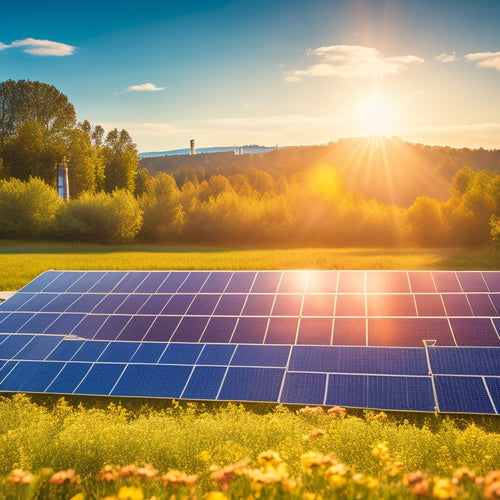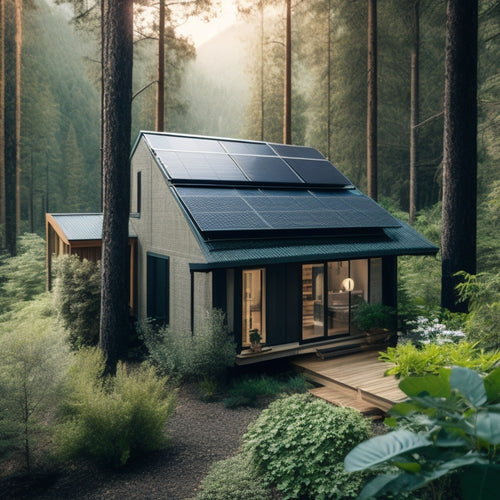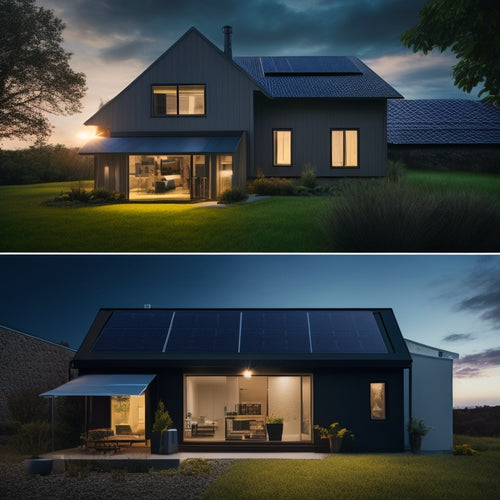
Backup Your Home With Renewable Energy Systems
Share
By investing in a renewable energy system, you're taking an important step towards reducing your carbon footprint and gaining energy independence. Solar power is a clean energy source that converts sunlight into electricity, stored in batteries for later use. To get started, you'll need to choose the right solar panels, considering factors like efficiency ratings, durability, and warranty. Properly sizing your system based on your energy needs and local climate is also essential. As you investigate the world of renewable energy, you'll uncover the benefits of grid-tie vs. off-grid systems, and how to optimize your system's performance - and now, you're one step closer to utilizing the full potential of renewable energy for your home.
Overview
- Solar power systems provide clean energy, reduce reliance on the grid, and lower carbon footprint, making them an ideal backup solution for homes.
- High-efficiency solar panels (above 20%) and durable batteries ensure optimal performance, energy independence, and long-term functionality.
- Assessing energy needs, local climate, and roof orientation helps determine the right system size, panel requirements, and battery size for reliable backup power.
- Grid-tie systems offer scalability and financial incentives, while off-grid systems provide complete energy independence, with regulatory considerations varying by location.
- Solar power provides significant financial incentives, long-term savings, and a strong return on investment, making it a viable option for homeowners seeking backup power.
Understanding Solar Power Basics
As you consider renewable energy systems for home backup, understanding solar power basics is an important first step. You need to grasp how solar energy works, its benefits, and its limitations.
Currently, solar energy trends are shifting towards more efficient and affordable systems. Renewable technology advancements have made solar power a viable option for home backup.
When selecting solar panels, it's vital to evaluate their efficiency ratings above 20% efficient and durable constructions for environmental resilience.
You should know that solar power generates electricity from sunlight, which is then stored in batteries for later use. This clean energy source reduces your reliance on the grid and lowers your carbon footprint.
Choosing the Right Solar Panels
When choosing the right solar panels for your home backup system, you'll want to take into account three key factors.
First, you'll need to evaluate panel efficiency ratings to confirm you're getting the most power per hour of sunlight. Look for high-quality panels with durable frames anodized aluminum or stainless steel that provide corrosion resistance and structural integrity.
Next, you'll want to assess durability and warranty options to assure a long-lasting investment.
Panel Efficiency Ratings
Selecting the right solar panels for your home backup system hinges on understanding panel efficiency ratings, which vary considerably between models. You want to maximize your energy output while minimizing the space required for installation. Efficiency ratings indicate how well a panel converts sunlight into electricity. A higher rating means more power per hour of sunlight.
| Panel Model | Efficiency Rating |
|---|---|
| Panasonic HIT-240 | 21.8% |
| LG NeON 2 | 20.5% |
| Trina Solar TALLMAX | 19.9% |
| Hanwha Q CELLS Q.PEAK | 19.5% |
When comparing panel performance, look for the highest efficiency rating that fits your budget. Efficiency comparison is essential, as it directly impacts your system's overall energy production. By choosing the right solar panels, you'll enjoy greater energy independence and a reduced carbon footprint.
Durability and Warranty
Your solar panel investment should be built to last, providing reliable energy for your home backup system over the long haul.
When choosing the right solar panels, you want to verify they can withstand various environmental conditions, such as extreme temperatures, humidity, and weather events.
Look for panels with high material longevity, as they'll be more resistant to degradation and degradation-related power losses.
Additionally, consider the significance of maintenance practices and warranties, such as Vmaxtanks 5-year warranty, which provide assurance of battery quality and performance.
A thorough warranty coverage is also essential, as it provides financial protection against panel failures or defects.
A good warranty should cover the panels for at least 25 years, with a minimum power output guarantee of 80%.
This guarantees you'll receive reliable energy for your home backup system over an extended period.
Budget Friendly Options
Most homeowners investing in a solar panel system for home backup want a reliable and affordable solution. You can achieve this by exploring budget-friendly options.
Consider community solar or energy cooperatives, which allow you to share the costs and benefits with neighbors. Financing options, government incentives, and local rebates can also reduce your upfront costs.
If you're handy, DIY installations can save you money on labor costs. Additionally, look for bulk purchasing discounts or renewable grants to further lower your expenses.
Before making a purchase, conduct an energy audit to determine the right system size for your home. Finally, take advantage of tax credits to maximize your savings.
Sizing Your Solar Power System
You'll need to accurately size your solar power system to guarantee it can meet your energy needs during an outage.
To do this, you'll first assess your energy needs, then calculate the required number of solar panels and their configuration.
Next, you'll determine the size of the battery bank needed to store excess energy generated during the day for use at night or during extended periods of low sunlight.
Assess Your Energy Needs
Determining the size of your solar power system requires a thorough evaluation of your energy needs. To do this, you'll need to analyze your energy consumption patterns, considering your lifestyle habits and energy usage during peak hours.
Research local regulations and solar incentives that may affect your system's size and efficiency. Consider your utility rates and how they may impact your energy costs.
Look for opportunities to improve energy efficiency in your home, such as upgrading to energy-efficient appliances. You may also want to investigate alternative sources of energy, like wind or geothermal, to supplement your solar power system.
Calculate Panel Requirements
Frequently, homeowners overlook the importance of accurately calculating panel requirements, which can lead to an undersized or oversized solar power system.
To avoid this, you'll need to determine your system's size based on your energy needs and local climate. Start by evaluating your roof's solar panel orientation, considering factors like direction and tilt.
A shading analysis will also help identify areas where trees, buildings, or other obstructions may reduce energy production. Using online tools or consulting with a professional, calculate the total wattage required to meet your energy demands.
This will guarantee you install the right number of panels to provide reliable backup power for your home. By doing so, you'll maximize your system's efficiency and enjoy the freedom that comes with renewable energy.
Determine Battery Size
As you move forward with designing your renewable energy system, sizing your solar power system's battery is a critical step that requires careful consideration. You'll need to determine the right battery size to guarantee your system can provide power during outages and at night.
| Battery Chemistry | Capacity Management | Recommended Battery Size |
|---|---|---|
| Lead-Acid | Simple | 1-2 days of autonomy |
| Lithium-Ion | Advanced | 2-3 days of autonomy |
| Saltwater | Basic | 1-2 days of autonomy |
| Flow Battery | Advanced | 3-5 days of autonomy |
| Nickel-Cadmium | Simple | 1-2 days of autonomy |
Consider factors like your energy usage, the number of days you want the system to provide power during an outage, and the type of battery chemistry you prefer. By choosing the right battery size, you'll guarantee your system provides reliable power when you need it most.
Solar Battery Options and Configurations
Selecting the right solar battery options and configurations is essential for a reliable and efficient home backup system.
You'll need to take into account solar battery types, such as lead-acid, lithium-ion, and saltwater batteries, each with its own pros and cons. Lead-acid batteries are cost-effective but have a shorter lifespan, while lithium-ion batteries are more expensive but offer longer battery life and higher efficiency. Saltwater batteries provide a sustainable option with a long lifespan.
You'll also need to decide on the configuration, such as a single battery bank or multiple parallel strings, to guarantee your system meets your energy needs. Proper configuration is critical to maximize your system's performance and longevity.
Installation and Maintenance Tips
When designing a reliable home backup system, a well-planned installation is essential to guarantee your renewable energy system operates at its best.
You'll want to carefully consider installation challenges, such as making sure proper ventilation, avoiding shading, and meeting local building codes.
It's also vital to develop a maintenance schedule to guarantee your system runs efficiently over time. This includes regular inspections, cleaning, and component replacements as needed.
You should also keep track of your system's performance and adjust your maintenance schedules accordingly.
Grid-Tie Vs. Off-Grid Systems
How much independence do you want from the grid? When considering renewable energy systems for home backup, you'll need to decide between grid-tie and off-grid systems.
Grid-tie systems offer advantages like system scalability, financial incentives, and lower installation difficulties. You'll still rely on the grid during periods of low energy production, but excess energy can be sold back to the utility company.
Off-grid systems, on the other hand, provide complete energy independence, reducing your environmental impact. However, they come with challenges like higher upfront costs, maintenance requirements, and power reliability concerns.
Regulatory considerations also vary depending on your location. Evaluating these factors will help you choose the right system for your needs.
Cost-Benefit Analysis of Solar Power
As you weigh the merits of grid-tie and off-grid systems, you'll want to contemplate the cost-benefit analysis of solar power, a key component of renewable energy systems for home backup.
Solar power offers significant financial incentives, including tax credits and rebates, which can offset the initial investment. In the long run, you'll enjoy long-term savings on your energy bills, as solar power generates electricity at a lower cost than traditional fossil fuels.
Additionally, solar panels require minimal maintenance and have a long lifespan, typically 25 years or more. By crunching the numbers, you'll find that solar power can provide a strong return on investment, making it a smart choice for homeowners seeking energy independence and financial freedom.
Frequently Asked Questions
Can I Install Solar Panels on a Metal or Tile Roof?
You'll need to assess your roof's compatibility before installing solar panels on a metal or tile roof, considering factors like material, age, and condition to guarantee a secure and efficient installation that meets your energy needs.
Are Solar Panels Resistant to Extreme Weather Conditions?
You'll be relieved to know that solar panels are designed to withstand extreme weather conditions, boasting impressive durability and resilience in the face of heavy rain, hail, and high winds, ensuring your energy independence remains uninterrupted.
Do Solar Panels Require Regular Cleaning for Optimal Performance?
You'll want to prioritize solar panel maintenance, as regular cleaning is essential for peak performance; the cleaning frequency depends on environmental factors, but generally, you should clean your panels every 6-12 months to guarantee maximum energy output.
Can I Use Solar Power to Charge My Electric Vehicle?
You can definitely use solar power to charge your electric vehicle, leveraging solar charging to fuel your eco-friendly ride; simply install a solar panel system that meets your vehicle's energy needs, and enjoy the freedom of sustainable transportation.
Are There Any Government Incentives for Installing Solar Power Systems?
When you're on a roll with solar power, you'll be thrilled to know you can cash in on federal tax credits and state rebates, cutting your installation costs and making the switch to clean energy a no-brainer.
Ready to Buy
As you capture the sun's fiery energy, your home changes into a self-sustaining haven. With every ray, you're weaving a protective shield against rising energy costs and environmental degradation. Your renewable energy system is the orchestra conductor, orchestrating a harmonious balance between nature and technology. Now, bask in the glow of energy independence, as your home echoes with the rhythm of a sustainable future.
Related Posts
-

Advantages of Solar Generating Systems Over Traditional Energy
Solar generating systems provide several key advantages over traditional energy sources. You'll experience lower long...
-

Off Grid Solar Batteries
As you shift to off-grid living, you'll rely on high-performance solar batteries to store excess energy generated by ...
-

Cost of Home Solar Battery
You're looking to invest in a home solar battery to reduce your grid reliance, but you're curious about the cost. The...


